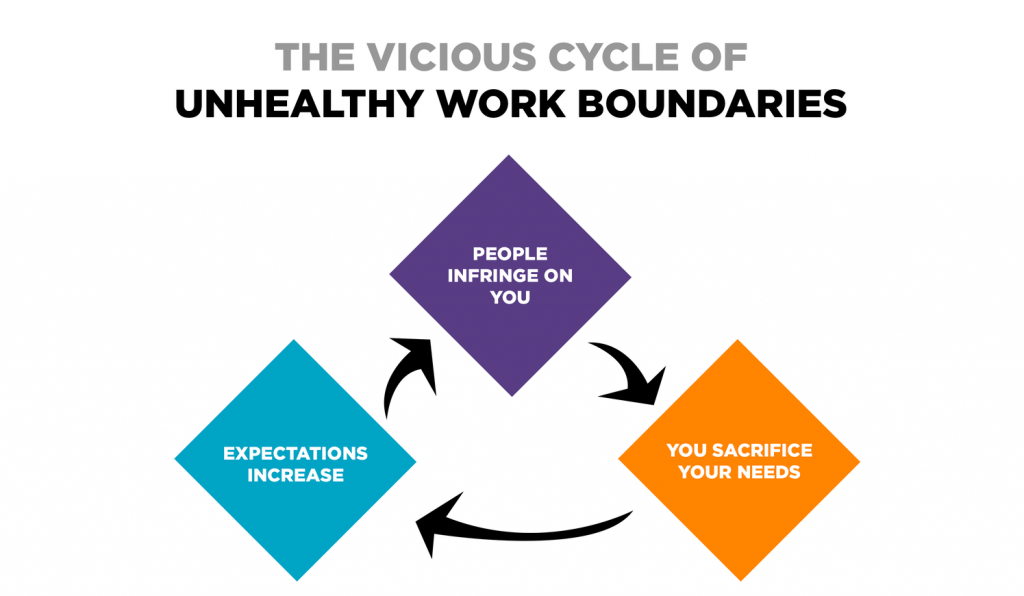Edition: August 18th, 2021
Curated by the Knowledge Team of ICS Career GPS

- Excerpts from article by Melody Wilding, published in the Harvard Business Review
Leaving your current role for a new one is exciting. You’re hopeful about your next position and looking forward to a fresh start. But for many professionals, the transition can also be filled with guilt.
The guilt of leaving a job can be particularly acute for those who identify as sensitive strivers, meaning they think and feel more deeply.
To cope with feelings of discomfort, many sensitive strivers overcompensate by trying to do more than necessary in their final days.
As one quarter to more than half of employees get ready to switch jobs post-pandemic, it’s important to realise that boundaries are just as important in your final days on the job as they are while gainfully employed by the company.
Here’s how to set healthy limits when you have one foot out of the door and how to navigate pitching in during your notice period:
1. Adjust your mindset to avoid guilt trips
- Your emotions influence your reactions, so get any misguided sense of guilt under control.
- High-achieving professionals, especially sensitive strivers, are built to aspire and evolve.
- See your transition as a natural step in your career progression, not an indictment on your dedication and character. You’re growing, not bailing.
- Also check your ego. You’re important to the company, but everything won’t fall apart without you. The team may experience some temporary setbacks, but they probably won’t be terminal or catastrophic.
- Your exit could open up an opportunity for someone else to step into the role and shine.
- Writing a note from your future self to your present self can also be a helpful exercise to let go of guilt.
2. Prioritise tasks that must be completed before you leave
- From a practical perspective, take a stock of the current projects on your plate.
- As soon as you know you’re leaving, determine the most important tasks to complete.
- You can’t accomplish everything in the time you have remaining, so prioritise impact and getting your work to a stable state where it can be taken over.
- This may mean scoping down the breadth or depth of certain deliverables to make them more achievable.
- Work with your boss to determine who will assume your duties, also assess how much you’re able and willing to assist with the transition given your other priorities.
3. Document your transition plan, include necessary details
- It’s best practice to offer to train your replacement but be smart and strategic about how you go about it so you don’t have to repeat yourself or duplicate effort.
- Create a transition plan that details your current projects, upcoming deadlines, and incumbent knowledge.
- Record videos that document processes and put aside time to write standard operating procedures for critical workflows.
- Memorialising your work will avoid excessive demands on your time down the road by giving your replacement a referenceable library of training material.
4. Redirect or say ‘no’ to new requests
- Even in your final days, colleagues may still come to you with new work to be done.
- When they do, don’t jump to complete the task simply to get it off your plate.
- Offer to train them on how to complete it for themselves or coach them through how to perform a process.
- Not only does this set a boundary, it empowers your colleagues to take ownership and become more self-sufficient, which they’ll need to do in your absence.
- There may be cases where you have to say no to a request altogether by stating:
- That’s not something I’m able to take on with my last day approaching.
- I have to decline, as I won’t be here to see this through.
- I appreciate you thinking of me. At the same time, I’ll have to pass in order to complete my current commitments.
5. Take the opportunity to kickstart habits that promote work-life balance
- Don’t wait until your next role begins to implement healthy boundaries you’ve been meaning to start.
- You have a low-risk opportunity right now to practise putting them into place, as you can’t be fired anymore!
- Now is the time to build discipline around limits like ending work at a certain hour or not answering emails on weekends.
- That way, you can take your newfound confidence into your next position.
6. Make a clean exit to be able to focus on your new role
- It’s wise to offer to stay in touch with your boss and colleagues but be careful not to make an open-ended invitation to consult or provide assistance beyond your final day at the company.
- Answering a question here-or-there is understandable, but pick a date by which you’ll no longer be available.
- If the questions continue past that time, you may have to send a final note explaining you won’t be responding in order to focus on your current role and wish them all the best.
Remember, setting boundaries in the last days of your job is an act of kindness and respect to yourself and others.
Navigating the short-term discomfort of saying no and setting limits ensures you can exit with your integrity intact.
…
(Disclaimer: The opinions expressed in the article mentioned above are those of the author(s). They do not purport to reflect the opinions or views of ICS Career GPS or its staff.)



